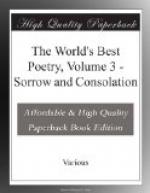When fell the night, up sprang the breeze,
And all the darkling hours they plied,
Nor dreamt but each the selfsame seas
By each was cleaving, side by side:
E’en so,—but why the tale reveal
Of those whom, year by year unchanged,
Brief absence joined anew to feel,
Astounded, soul from soul estranged?
At dead of night their sails were filled,
And onward each rejoicing steered;—
Ah! neither blame, for neither willed
Or wist what first with dawn appeared.
To veer, how vain! On, onward strain,
Brave barks! In light, in darkness
too,
Through winds and tides one compass guides;
To that and your own selves be true.
But O blithe breeze! and O great seas!
Though ne’er, that earliest parting
past,
On your wide plain they join again,—
Together lead them home at last.
One port, methought, alike they sought,—
One purpose hold where’er they fare;
O bounding breeze, O rushing seas,
At last, at last, unite them there!
ARTHUR HUGH CLOUGH.
ADIEU, ADIEU! MY NATIVE SHORE.
Adieu, adieu! my native shore
Fades o’er the waters blue;
The night-winds sigh, the breakers roar,
And shrieks the wild sea-mew.
Yon sun that sets upon the sea
We follow in his flight;
Farewell awhile to him and thee,
My native Land—Good Night!
A few short hours, and he will rise
To give the morrow birth;
And I shall hail the main and skies,
But not my mother earth.
Deserted is my own good hall,
Its hearth is desolate;
Wild weeds are gathering on the wall;
My dog howls at the gate.
LORD BYRON.
FAREWELL TO HIS WIFE.
Fare thee well! and if forever,
Still forever, fare thee well;
Even though unforgiving, never
’Gainst thee shall my heart rebel.
Would that breast were bared before thee
Where thy head so oft hath lain,
While that placid sleep came o’er thee
Which thou ne’er canst know again:
Would that breast, by thee glanced over,
Every inmost thought could show!
Then thou wouldst at last discover
’Twas not well to spurn it so.
Though the world for this commend thee,—
Though it smile upon the blow,
Even its praises must offend thee,
Founded on another’s woe:
Though my many faults defaced me,
Could no other arm be found
Than the one which once embraced me,
To inflict a cureless wound?
Yet, O, yet thyself deceived not:
Love may sink by slow decay;
But by sudden wrench, believe not
Hearts can thus be torn away:
Still thy own its life retaineth,—
Still must mine, though bleeding, beat;
And the undying thought which paineth
Is—that we no more may meet.




